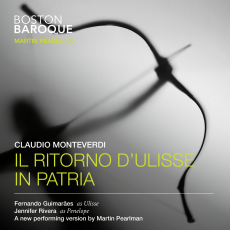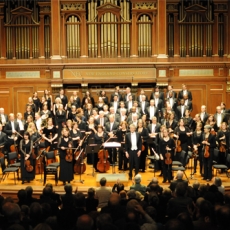Boston Baroque - Monteverdi: Ulisse - InfoDad
Long unaccepted as a genuine opera by Monteverdi, Il Ritorno d'Ulisse in Patria (1640) has been acknowledged, since being proven authentic in the 1950s, as a work every bit as worthy as Orfeo (1607) and L'incoronazione di Poppea (1642). A splendid Boston Baroque recording of Martin Pearlman's own new edition of the opera, released by Linn Records, shows this work to be richly textured and - thanks to fine performances by tenor Fernando Guimarães as Ulisse and mezzo-soprano Jennifer Rivera as Penelope - emotionally trenchant. This is more than a simple tale of revenge, which is to say that Giacomo Badoaro's libretto retains some of the ambiguity of books 13-23 of Homer's Odyssey, on which it is based. On the one hand the story of the return home at last of an aging warrior who finds the world changed around him and his faithful wife under unending assault by demanding suitors, this is on the other hand the tale of a man portrayed as heroically noble and tremendously crafty - who commits an act of extreme violence that leaves the audience pondering his legacy and the extent of his humanity. Pearlman does a first-rate job in his edition of filling in the many gaps in the surviving manuscript of this opera, producing a version with fine attention to detail and full, clear appreciation of period style. By using a continuo of seven instruments, and 13 players in accompaniments of arias, Pearlman gives the opera a tonal richness that it does not always possess in accounts that hew more closely to what survives of the manuscript but not, perhaps, to Monteverdi's original intentions and performance plans. Pearlman uses recorders and cornetti in ritornelli, but stops short of so expanding the ensemble as to overweight the non-verbal portions of the score: this is an opera that belongs to the singers. And the youthful cast here is particularly fine, with Guimarães tremendously moving in the recognition scene with Aaron Sheehan as Telemachus, and Rivera displaying a voice of beauty and expressive power, with an especially impressive lower range. All the singing roles are well filled, and the orchestral playing is outstanding throughout, as Pearlman conducts with a firm hand and precise cuing that keeps the action moving ahead smartly while showcasing the beauties and emotional depths of Monteverdi's score. Since the surviving manuscript does not fully indicate instrumentation, any edition of Il Ritorno d'Ulisse in Patria requires guesswork, and Pearlman's offers a well-chosen approach throughout that always sounds right - and that lets the emotional impact of the story come through clearly. There have been several high-quality recordings of this opera with conductors whose knowledge of historic performance practice is strong, including Raymond Leppard and Nikolaus Harnoncourt. Pearlman's stands up to any of them, and its emphasis on the psychological depth of the opera gives this 375-year-old work considerable resonance today, likely causing listeners to confront their own feelings about the use of extreme violence in a good cause.

